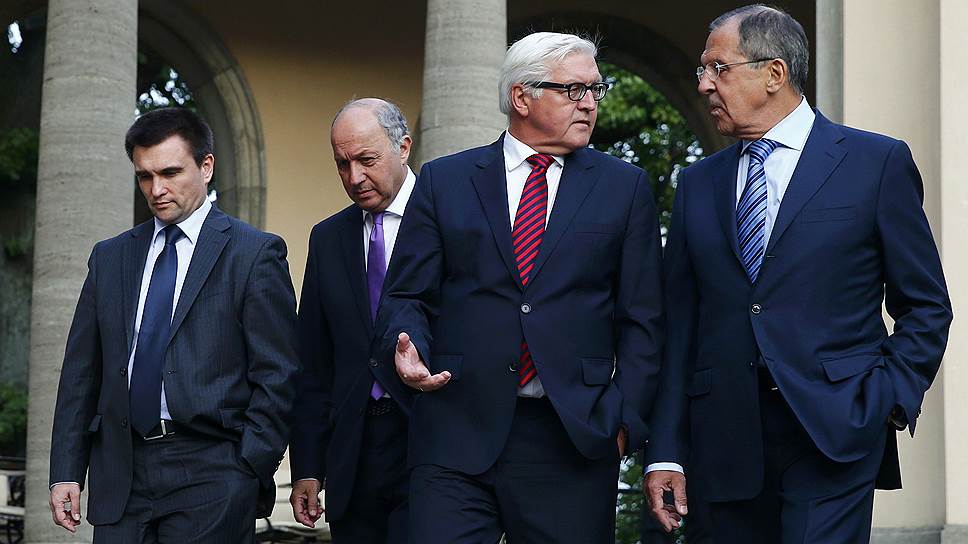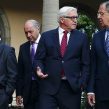
Minsk Armistice Implementation in Ukraine Officially Postponed
Publication: Eurasia Daily Monitor Volume: 12 Issue: 204
By:

Meeting on November 6, in Berlin, the ministers of foreign affairs of the “Normandy” group (Russia, Germany, France, Ukraine) finally acknowledged that the Minsk armistice cannot be implemented by this year’s end, as originally intended. They agreed to postpone the implementation into next year, without setting another deadline. The Russian, German and French ministers resolved that the armistice (signed on February 12, 2015) shall remain in force as long as necessary, until its “full implementation.” The Ukrainian side could hardly object to this decision, although President Petro Poroshenko had repeatedly called for the “Minsk process” to be completed in 2015, not to be prolonged into 2016.
Russia’s Foreign Minister Sergei Lavrov displayed equanimity bordering on satisfaction with this state of affairs in Berlin. At the meeting’s conclusion, Lavrov declared, “There is no doubt on anyone’s part that the Minsk agreements remain in force until fully carried out,” their implementation postponed into next year. In Moscow’s view, as Lavrov restated it on this occasion, the implementation of the armistice amounts to legalizing Russia’s proxy authorities in Donetsk and Luhansk. This is to be achieved through local elections, constitutional status (often referenced as special status) of that territory, and direct negotiations between Donetsk-Luhansk and Kyiv (Interfax, November 7, 9).
Moscow, however, does not seem in a hurry to complete that political process. Germany, France and other Western European governments seem more anxious to bring that political process to completion, pronounce the Minsk armistice as implemented, conserve this conflict, wind down sanctions on Russia and address other crises. Hence they were reticent to acknowledge failure in missing that deadline, whereas Lavrov could be smug about it.
Russia prefers an open-ended process, stringing the Western powers along, thriving on ambiguity and leveraging that against Ukraine, rather than seeking a conclusive solution. This is why Moscow poses seemingly “unreasonable” demands regarding the technicalities of elections to be staged in Ukraine’s Russian-controlled territory. Those demands seem, in fact, calculated to be unacceptable to the West (let alone to Ukraine) and drag out the negotiations longer.
The ceasefire is holding, since September 1, in the field, but the Minsk armistice is largely a political document. All sides call for “full implementation of the obligations under the Minsk agreements,” but they attach different meanings to this formula.
In Ukraine’s view, it means the withdrawal of Russian and proxy forces from Ukraine’s territory and the restoration of Ukraine’s control at the border; at that point, elections are to be held in those “certain districts of the Donetsk and Luhansk provinces,” and Ukraine’s law on “special procedures for those districts’ self-administration” comes into effect. Russia denies having any military presence there but wants Ukraine to enshrine a constitutional status for those “certain districts” and a legal basis for elections there, “by agreement” between Kyiv and Donetsk-Luhansk, as Ukraine’s “Minsk obligations.” Western diplomacy similarly holds Ukraine to those “obligations” regarding that territory’s constitutional status and elections. However, Russia is expected, in return, to withdraw its forces from Ukraine’s territory and allow Ukraine to regain control of the border. Washington emphasizes both of these points, Berlin emphasizes the second, while Paris emphasizes neither. The Quai d’Orsay omitted this issue from its readout of Foreign Minister Laurent Fabius’s participation in the Berlin meeting (Diplomatie.gouv.fr, November 6).
The Western position (insofar as a common position exists) suffers from several weaknesses, all in evidence at the “Normandy” meeting in Berlin. First, the sequence of “implementing the Minsk agreement” puts the onus on Ukraine to fulfill its political “obligations” first, as pre-conditions to the withdrawal of Russian troops and the restoration of Ukrainian control at the border. Western diplomacy presumes such a tradeoff, but is in no position to guarantee that Russia would comply after Ukraine carried out its “obligations.” Second, that tradeoff (whether it works out or not) implies that Ukraine’s sovereignty is a conditional one. Asking Ukraine to adjust its constitution and legislation to its “Minsk obligations” (see above) also signifies that the Minsk document’s political clauses override certain aspects of Ukraine’s sovereignty. And thirdly, to conserve this conflict without having to resolve it, Western diplomacy seems prepared to countenance what Ukraine regards as “fake elections” in the Russian-controlled territory.
However, the political process has not reached those stages yet. According to German Foreign Minister Frank-Walter Steinmeier, the Berlin meeting focused on military measures, mostly add-ons to the Minsk armistice. The four ministers were satisfied with the pullback of light artillery (cannon with calibers up to 100 millimeters, mortars up to 120 millimeters), as well as tanks, to distances of at least 15 kilometers on either side of the front line. This process is not yet completed, but well on track. The resulting “buffer zone,” at least 30 kilometer wide, is then to be de-mined, under procedures yet to be negotiated. Kyiv regards such measures, additional to the Minsk armistice, as potentially stabilizing, with proper verification and safeguards. But they must not distract attention from the non-fulfillment of the military clauses of the Minsk armistice by Russian and proxy forces.
The pullback of missile systems and heavy artillery, mandated by the Minsk armistice in February, seems far from complete (Auswaertiges-amt.de, November 6). Russian and proxy forces are far superior in those categories, and the pullback on their side is largely unverifiable on territories of the Donetsk and Luhansk “people’s republics.” In the Berlin meeting, Ukrainian Foreign Minister Pavlo Klimkin insisted that the Organization for Security and Cooperation in Europe’s Special Monitoring Mission (OSCE SMM) be allowed to open “many more” observation points along the contact line and along the Ukraine-Russia border, so as to verify the pullout and storage of those heavy weapons systems. The German and French ministers supported Klimkin on this issue, but Lavrov apparently did not (Ukrinform, November 6).
Although the weaponry and some of the personnel were transferred from Russia to Donetsk and Luhansk forces, this reality is not reflected in the documents generated by the Normandy and Minsk negotiating processes. These processes are so structured as to exempt Russia from the aggressor’s liabilities.




